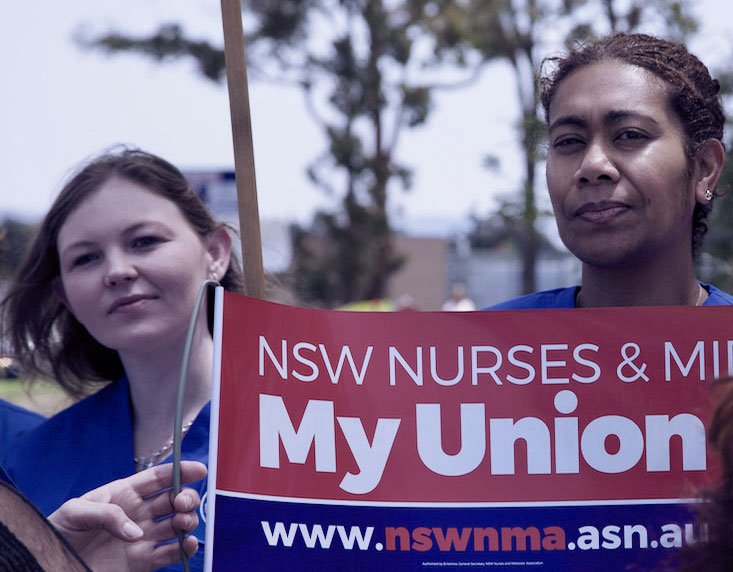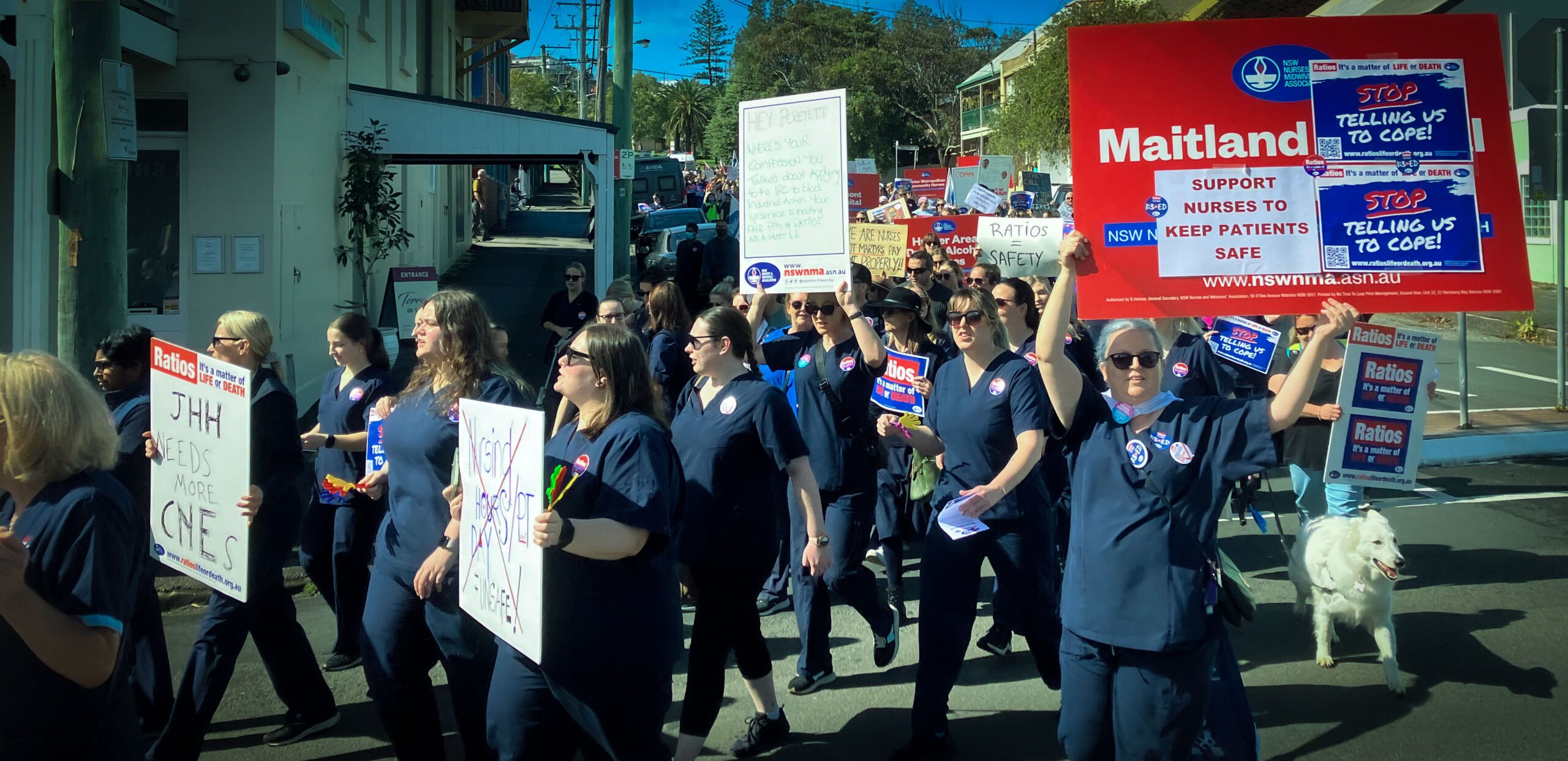NSWNA wins family violence clause for Public Health System Nurses’ Award.
Employees who experience domestic violence (or family violence as it is now known) will gain access to a range of workplace support measures through the Public Health System Nurses’ Award, thanks to a campaign by the NSWNA and other unions.
‘We want to raise awareness about the need for all health industry employers to make sure they are supporting staff who might be experiencing family violence,’ said NSWNA Assistant General Secretary Judith Kiejda.
In late June, the Public Health System Award was varied to include a clause added to the Nurses’ Award 2010 that nurses and midwives can use their family and carer’s leave and sick leave entitlements for matters relating to family violence, and if they have exhausted these entitlements they will be able to access an additional five paid days per year.
‘The clause will also allow for flexible work hours and changing telephone and email where appropriate. The ability to access further leave recognises the needs of workers experiencing family violence, such as requiring time with health, legal, financial, housing, social security and other advisors and support services,’ said Judith.
The NSWNA is the first health union in NSW to achieve these extra leave support measures in an Award.
The Association is also including family violence clauses in the core claims for all Enterprise Agreements coming up for renewal outside the public sector.
In September 2010, the first Australian family violence clauses were incorporated into the enterprise agreement between the Surf Coast Shire Council (Victoria) and the Australian Services Union’s (ASU) Victorian Authorities and Services Branch, providing a world’s best practice model, with up to 20 days of extra paid leave for reasons of family violence, such as attending legal appointments.
Following negotiations by the Public Service Association, the Crown Employees Award was varied in February this year to provide other NSW public-sector workers with family-violence clauses, including five extra days of paid leave.
Impacts of family violence
The Australian Domestic and Family Violence Clearinghouse (ADFVC), which is funded by the Commonwealth Department of Education, Employment and Workplace Relations, noted the following impacts of family violence:
- Two thirds of women who have experienced family violence with their current partner are in paid employment.
- American research suggests that 10% of the workforce have experienced violence from their partner within the past 12 months.
- VicHealth found that family violence is the leading contributor to death, disability and illness in women aged 15-44 years, being a greater contributor than high blood pressure, smoking or obesity.
- The impact on work performance puts job security at risk, with up to half the women in one study reporting losing a job, at least in part due to family violence.
- 24% of female family violence victims reported an incident of family violence had occurred in the workplace in the previous 12 months, most commonly abusive and repeated phone calls or emails.
- Women with a history of family violence have a more disrupted work history, are on lower personal incomes, have had to change jobs more often and are employed at higher levels in casual and part-time work than women with no experience of violence.
- Access Economics estimated the total costs of lost productivity associated with family violence was $484 million in 2002/2003.
‘Staying in employment is critical to reducing the effects of the violence. By supporting women to remain in paid employment, workplaces can assist women on their pathway out of violence and keep the whole workplace safer,’ the ADFVC said.
IMPORTANT NOTE
While ADFVC’s research refers mainly to women who have experienced family violence, the NSWNA recognises that family violence happens to both women and men, and in heterosexual as well as same-sex relationships. When pressing for the inclusion of family violence clauses, the Association will ensure they are gender non-specific.
Take part in our survey on family violence
Unions across all industries have identified that family violence is an important workplace issue. The NSWNA is calling on members to participate in a confidential, government-funded independent survey of a range of workers across NSW, about the incidence of family violence and the impact it has on people at work.
‘This is your chance to give us information and to help persuade employers in the health sector that this is a real issue in their own workplaces. Nurses and midwives are in a unique position because we see some of the most visible consequences of family violence in our work,’ said Judith.
NSWNA members whose email addresses are held by the Association received an email link to this confidential survey in June and the NSWNA urges you to complete it! If you would like the survey link sent to you, email kr****@***********sn.au
The survey is being run by the University of NSW with Ethics Committee approval. All nurses who have something to say about family violence, affecting you or someone in your workplace, are encouraged to participate.
‘One colleague used to come to work with bruises on her face almost every week. Her husband would turn up in the middle of the night when she was on night shift to check she was at work. She constantly lived in fear.’
A former aged care nurse, who preferred to remain anonymous, told The Lamp she had witnessed three of her colleagues experience family violence – all at different workplaces.
‘One colleague used to come to work with bruises on her face almost every week. Sometimes she’d wear sunglasses right throughout her shift. Her husband would turn up in the middle of the night when she was on night shift to check she was at work. She constantly lived in fear. Whatever shift she did she had to make sure she was home at a certain time because if she wasn’t, she’d be off sick next day and come in the following day with bruises,’ the member said.
‘In another case, a colleague’s husband would constantly ring her at work and verbally abuse her. Sometimes he would go off drinking while she was at work, leaving her two small children alone at home. She’d get a call from a neighbour and would have to go home to take care of the kids, then when she came in the next day she’d be told off by her manager who said she was shirking her duty of care. She’d also get reprimanded for having too many personal calls – from her abusive husband! She was fearful, not only of her home situation but also fearful of losing her job.
‘Putting family violence clauses into workplace agreements and awards alleviates some of that fear because employees know they can take time off because it is an entitlement,’ the member said.







